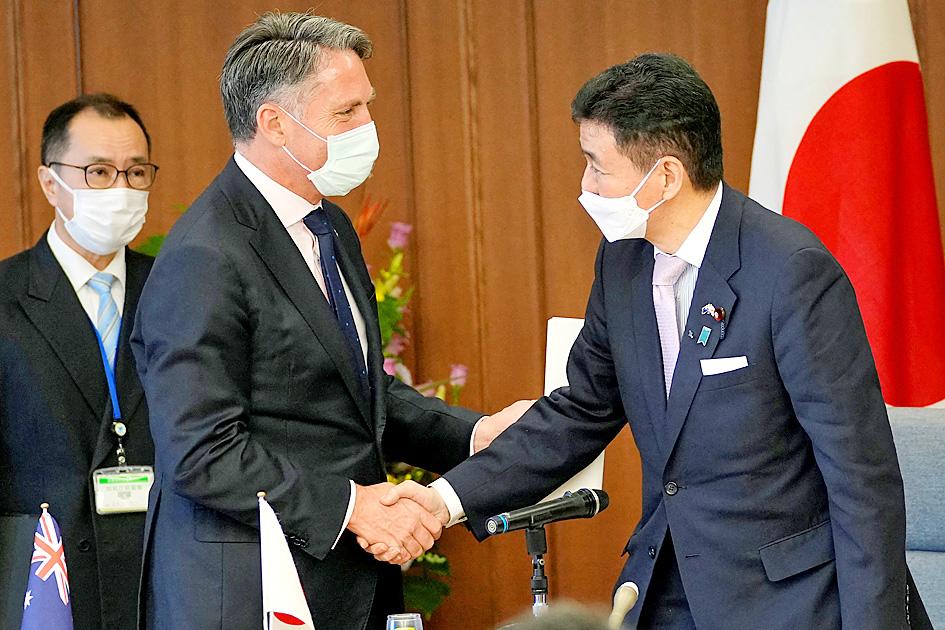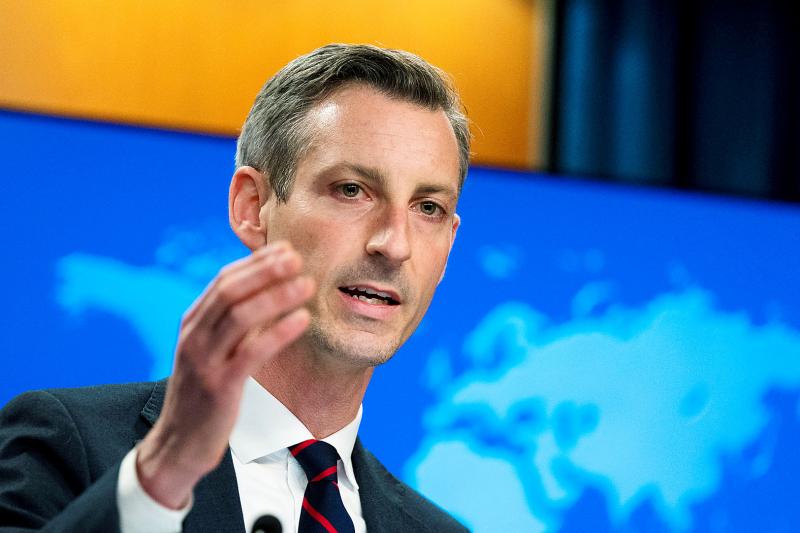The US on Tuesday backed Taiwan’s assertion that the Taiwan Strait is an international waterway, a further rebuff to Beijing’s claim to exercise sovereignty over the strategic passage.
On Monday, the Chinese Ministry of Foreign Affairs said the country “has sovereignty, sovereign rights and jurisdiction over the Taiwan Strait,” and called it “a false claim when certain countries call the Taiwan Strait ‘international waters.’”
On Tuesday, US Department of State spokesman Ned Price said in an e-mail: “The Taiwan Strait is an international waterway, meaning that the Taiwan Strait is an area where high-seas freedoms, including freedom of navigation and overflight, are guaranteed under international law.”

Photo: Reuters
The world has “an abiding interest in peace and stability in the Taiwan Strait, and we consider this central to the security and prosperity of the broader Indo-Pacific region,” he added.
Price reiterated US concerns about China’s “aggressive rhetoric and coercive activity regarding Taiwan,” and said the US “would continue to fly, sail and operate wherever international law allows, and that includes transiting through the Taiwan Strait.”
In Taipei, Premier Su Tseng-chang (蘇貞昌) yesterday said the Strait was by “no means China’s inland sea.”

Photo: Reuters
“China’s ambition to swallow up Taiwan has never stopped or been concealed,” he told reporters. “The Taiwan Strait is a maritime area for free international navigation.”
China’s Taiwan Affairs Office said that Taipei was “cooperating with external forces to hype up the issue.”
This “harms the interests of compatriots on both sides of the Taiwan Strait and betrays the interests of the Chinese nation — it is despicable,” office spokesman Ma Xiaoguang (馬曉光) said in Beijing.
In related news, Japan and Australia’s defense ministers yesterday vowed to step up their ties to support democratic values in the Indo-Pacific region, and agreed to work more closely with Southeast Asia and the Pacific island nations where China is seeking to expand its influence.
Australian Minister for Defence Richard Marles and his Japanese counterpart, Nobuo Kishi, said that regionwide cooperation is necessary to maintain and strengthen the rules-based order in the Indo-Pacific region, where there is growing fear that Russia’s invasion of Ukraine might embolden China to increase its assertiveness.
“It is clear that our region faces the most complex set of strategic circumstances we have had since the end of World War II and what the region does matters,” Marles told a joint news conference in Tokyo after holding talks with Kishi.
“Only by working together can we uphold the rules-based international order, contribute to an effective balance of military power and ensure our region remains stable, peaceful and prosperous,” Marles added.
Kishi said the two ministers shared their concerns about the impact of Russia’s invasion of Ukraine.
He said they remain strongly opposed to any unilateral change of the “status quo” in the East and South China seas, and reaffirmed their commitment to a mutual vision of “a free and open” international order of the seas.

‘ABUSE OF POWER’: Lee Chun-yi allegedly used a Control Yuan vehicle to transport his dog to a pet grooming salon and take his wife to restaurants, media reports said Control Yuan Secretary-General Lee Chun-yi (李俊俋) resigned on Sunday night, admitting that he had misused a government vehicle, as reported by the media. Control Yuan Vice President Lee Hung-chun (李鴻鈞) yesterday apologized to the public over the issue. The watchdog body would follow up on similar accusations made by the Chinese Nationalist Party (KMT) and would investigate the alleged misuse of government vehicles by three other Control Yuan members: Su Li-chiung (蘇麗瓊), Lin Yu-jung (林郁容) and Wang Jung-chang (王榮璋), Lee Hung-chun said. Lee Chun-yi in a statement apologized for using a Control Yuan vehicle to transport his dog to a

Taiwan yesterday denied Chinese allegations that its military was behind a cyberattack on a technology company in Guangzhou, after city authorities issued warrants for 20 suspects. The Guangzhou Municipal Public Security Bureau earlier yesterday issued warrants for 20 people it identified as members of the Information, Communications and Electronic Force Command (ICEFCOM). The bureau alleged they were behind a May 20 cyberattack targeting the backend system of a self-service facility at the company. “ICEFCOM, under Taiwan’s ruling Democratic Progressive Party, directed the illegal attack,” the warrant says. The bureau placed a bounty of 10,000 yuan (US$1,392) on each of the 20 people named in

INDO-PACIFIC REGION: Royal Navy ships exercise the right of freedom of navigation, including in the Taiwan Strait and South China Sea, the UK’s Tony Radakin told a summit Freedom of navigation in the Indo-Pacific region is as important as it is in the English Channel, British Chief of the Defence Staff Admiral Tony Radakin said at a summit in Singapore on Saturday. The remark came as the British Royal Navy’s flagship aircraft carrier, the HMS Prince of Wales, is on an eight-month deployment to the Indo-Pacific region as head of an international carrier strike group. “Upholding the UN Convention on the Law of the Sea, and with it, the principles of the freedom of navigation, in this part of the world matters to us just as it matters in the

The High Court yesterday found a New Taipei City woman guilty of charges related to helping Beijing secure surrender agreements from military service members. Lee Huei-hsin (李慧馨) was sentenced to six years and eight months in prison for breaching the National Security Act (國家安全法), making illegal compacts with government employees and bribery, the court said. The verdict is final. Lee, the manager of a temple in the city’s Lujhou District (蘆洲), was accused of arranging for eight service members to make surrender pledges to the Chinese People’s Liberation Army in exchange for money, the court said. The pledges, which required them to provide identification